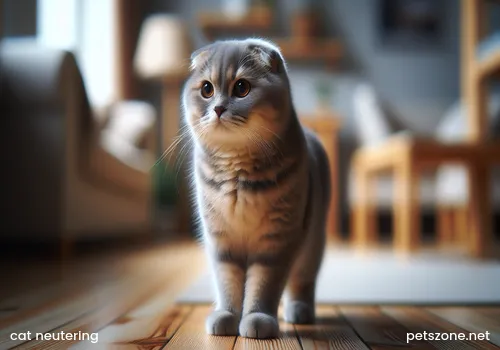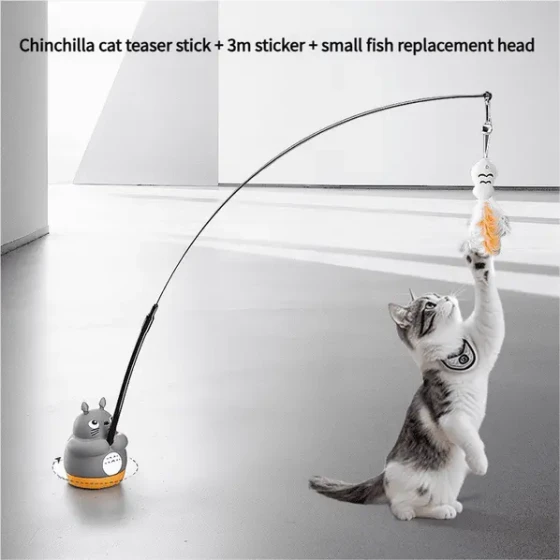Cat Died from Vomiting Blood Three Days after Neutering_ Serious Consequences of Improper Postoperative Care
Cat neutering surgery is usually a relatively safe procedure, but improper postoperative care can indeed lead to serious complications, even life-threatening ones, such as wound infection, bleeding, anesthesia reactions, hypoglycemia, and gastrointestinal discomfort causing vomiting. Vomiting blood after neutering is a warning sign that should not be ignored and may be related to various factors, including gastrointestinal reactions caused by anesthesia, insufficient fasting and water restriction after surgery, wound bleeding, or more severe internal problems.

Common Discomforts and Potential Risks after Cat Neutering Surgery
Cats may experience some common discomfort symptoms within one or two days after neutering, which is a normal response of the body to surgery and anesthesia. These symptoms include drowsiness, lethargy, decreased appetite, mild wound redness or swelling, and sensitivity or pain when touching the wound area. Some cats may experience rapid breathing, trembling limbs, and even temporary incontinence or vomiting during anesthesia recovery. The recovery differs slightly between male and female cats; female cats undergo abdominal surgery with relatively larger wounds, so the pain may last longer.
However, if the following situations occur, cat owners need to raise alarm and promptly contact a veterinarian:
- Persistent vomiting or vomiting with blood: Vomiting shortly after surgery may be normal, but if it continues or there is blood streaks or clots in the vomit, it may indicate more severe issues such as gastrointestinal injury, internal bleeding, or severe reactions to anesthesia.
- Abnormal wound condition: Continuous wound bleeding, large amounts of discharge (especially pus or yellow-green secretions), increased redness or swelling, persistent swelling or even wound opening. Male cat neutering wounds are usually not sutured, but continuous heavy bleeding is abnormal.
- Extreme lethargy: Appropriate rest after surgery is essential, but if the cat is extremely drowsy, unwilling to move, or unable to stand steadily for more than 24-48 hours, it may be a sign of health problems.
- Long-term loss of appetite: Appetite decline in the first one or two days post-surgery is normal, but refusal to eat for more than 24-48 hours requires attention.
- Abnormal breathing: Rapid or labored breathing, abnormal color of mouth and tongue (such as bluish), may be related to anesthesia-induced pulmonary edema or aspiration pneumonia.
- Difficulty or abnormalities in excretion: Temporary changes in urination or defecation may occur after surgery, but if the cat is unable to urinate or defecate normally for more than 24-72 hours, or if there is blood in the urine, seek veterinary care promptly.
Possible Causes of Vomiting Blood after Cat Neutering
Vomiting blood after neutering is uncommon but generally indicates an urgent situation when it occurs. Here are some possible culprits:
- Side effects of anesthesia drugs: Certain anesthesia drugs may irritate the cat's gastrointestinal tract, causing nausea and vomiting, and in severe cases leading to gastric mucosal bleeding, resulting in blood in vomit. Lack of strict preoperative fasting and water restriction can also increase the risk of vomiting and aspiration.
- Internal bleeding after surgery: Although neutering is a mature technique, there is a very low chance of internal bleeding. Female cat neutering involves ligation of ovarian and uterine blood vessels; if ligation is insecure or tissue tears, it may cause abdominal bleeding, which can irritate the gastrointestinal tract and induce vomiting, even vomiting blood. Male cat neutering, though less traumatic, can also result in subcutaneous or internal bleeding.
- Intraoperative or postoperative aspiration: During anesthesia or recovery, if vomiting occurs, stomach contents may be aspirated into the trachea and lungs, leading to aspiration pneumonia. Severe inflammation and damage may cause coughing, difficulty breathing, and even blood in vomit.
- Pre-existing or underlying health problems: Some cats may have undetected health issues before surgery, such as coagulation disorders, gastrointestinal diseases (like gastric ulcers, enteritis), pancreatitis, etc., which could worsen under surgical stress or anesthesia, resulting in postoperative hematemesis.
- Stress reactions: Cats are sensitive animals; surgery, unfamiliar environments, and pain can cause strong stress reactions. Severe stress may result in a series of symptoms including gastrointestinal disorders or bleeding.
- Improper postoperative care: Although less likely to directly cause vomiting blood, improper care leading to severe infection, wound opening, and complications can worsen the cat’s overall condition and indirectly affect gastrointestinal function.
Postoperative Care: The Key to Avoiding Tragedy
Postoperative care after cat neutering ensures smooth recovery and prevents complications. Just as humans need "confinement" after surgery, cats also require a carefully nurtured recovery period.
- Provide a quiet and comfortable environment: Place the cat in a warm, quiet, softly lit area to reduce external disturbances and avoid overexcitement or stress. It’s best to restrict the cat to a smaller space initially to prevent vigorous activity.
- Strictly follow fasting and water restriction instructions: When to start feeding and watering, as well as type and amount of food, must be strictly according to the veterinarian's instructions. Usually, a few hours after surgery, small amounts of water can be offered first; if no vomiting occurs, then small amounts of easily digestible food can be given.
- Wear an Elizabethan collar or postoperative clothing: This is key to preventing the cat from licking or scratching the wound, which could cause infection or wound opening. Even if the cat shows discomfort or resistance, it must be maintained for their health.
- Closely monitor the wound conditions: Check daily for redness, swelling, discharge, bleeding, or wound opening. Contact a veterinarian promptly if abnormalities appear. Male cat neutering wounds typically heal naturally without sutures, but abnormal bleeding or infection should be watched for.
- Monitor appetite, water intake, and excretion: Record the cat’s eating, drinking, urination, and defecation. If loss of appetite or abnormal excretion persists, consult a veterinarian.
- Restrict vigorous activity: Avoid running, jumping, climbing, or other intense exercise for at least one week post-surgery to prevent wound strain.
- Administer medication as directed: The veterinarian may prescribe painkillers or antibiotics; follow dosage and timing carefully. Do not give human medications randomly to avoid poisoning.
- Maintain environmental hygiene: Regularly clean the cat’s living area, especially the litter box, using low-dust or paper-based cat litter to prevent bacterial infection of wounds.
- Pay attention to the cat’s emotional changes: Neutering may affect a cat’s mood. Some cats become more clingy; others may show stress, hiding, or aggressive behaviors. Provide extra care and patience to help them adjust.
- Timely follow-ups: Take the cat back to the veterinary hospital regularly as advised to confirm wound healing.
Frequently Asked Questions
Q1: How long does it take for a cat to recover to normal after neutering?
A1: Recovery time varies individually. Male cats usually heal faster, with wounds closing in about 7-10 days. Female cats undergo more invasive surgery, so full recovery can take 10-14 days. Most cats gradually return to normal activities within 3-7 days after surgery.
Q2: Is vomiting normal after cat neutering?
A2: Short-term vomiting soon after surgery may be a normal reaction to anesthesia or fasting, but persistent, frequent vomiting or vomiting with blood is abnormal and requires prompt veterinary attention.
Q3: What should I do if my cat’s wound bleeds after neutering?
A3: Minor oozing within 24 hours after surgery might be normal, but if bleeding is heavy, continuous, or the wound opens causing bleeding, contact a veterinarian immediately or take the cat to the hospital.
Q4: What if my cat refuses to eat after neutering?
A4: Appetite decline in the first 1-2 days is common; you can offer favorite, easily digestible foods. If the refusal to eat persists beyond 24-48 hours, consult a veterinarian.
Q5: Does my cat need to wear the Elizabethan collar all the time after neutering?
A5: The Elizabethan collar must be worn until the wound is fully healed, usually 5-10 days for male cats and 10-14 days for female cats, depending on the vet's instructions. It’s vital to prevent the cat from licking the wound, which can lead to infection or opening.
Conclusion
Cat neutering is an important measure to ensure their health and reduce disease risks, but postoperative care is equally crucial. The extreme example of "cat died from vomiting blood three days after neutering" mentioned in this article reminds us that improper postoperative care can indeed have severe consequences. As responsible cat owners, not only should we choose reputable veterinary hospitals for surgery but also invest sufficient effort in detailed postoperative care, closely monitor the cat’s condition, and never ignore any abnormalities. Promptly seeking professional veterinary help will allow our furry friends to safely and healthily pass through the recovery period. After all, their health and happiness are our greatest wishes.
-560x560.webp)


-560x560.webp)

